Understanding the dangers of toxic foods for dogs is crucial for pet owners, as common items like chocolate, grapes, and onions can cause severe health issues. Awareness is key to prevention.
Overview of the Importance of Understanding Toxic Foods for Dogs
Understanding toxic foods for dogs is essential for pet owners to prevent accidental poisoning and ensure their pets’ safety. Dogs metabolize substances differently from humans, making certain foods inherently dangerous. Common household items like chocolate, grapes, and onions can cause severe health issues, ranging from mild discomfort to life-threatening conditions. Awareness of these risks allows owners to make informed decisions about their dogs’ diets and environments. Preventative measures, such as proper food storage and avoiding harmful treats, can significantly reduce the likelihood of toxicity. Education and vigilance are key to safeguarding canine health and preventing costly veterinary emergencies.
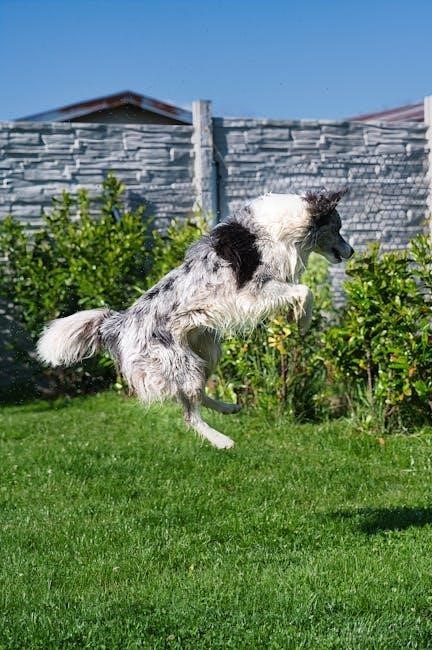
Common Foods Toxic to Dogs
Common Foods Toxic to Dogs outlines dangerous foods for dogs, emphasizing the importance of awareness to prevent health risks from seemingly harmless items.
Chocolate: The Dangers of Theobromine
Chocolate contains theobromine, a compound toxic to dogs due to their inability to metabolize it efficiently. Dark chocolate and baking chocolate are particularly hazardous because of higher theobromine levels. Ingestion can lead to vomiting, diarrhea, increased heart rate, and in severe cases, seizures or heart failure. Even small amounts can cause mild symptoms, while larger quantities are life-threatening. Factors like the dog’s size and the chocolate’s type influence toxicity. Pet owners should strictly avoid giving chocolate to dogs and store it securely. If ingestion occurs, immediate veterinary consultation is crucial to prevent serious health complications and ensure timely treatment.
Grapes and Raisins: Their Mysterious Toxicity
Grapes and raisins are highly toxic to dogs, though the exact compound causing harm remains unknown. Even small amounts can trigger severe reactions, including vomiting, diarrhea, and lethargy, progressing to acute kidney failure. The toxicity varies unpredictably between dogs, with some experiencing mild symptoms and others facing life-threatening conditions. Factors like the quantity consumed and individual sensitivity play roles. Pet owners should completely avoid giving grapes or raisins to their dogs, as there is no safe threshold. Immediate veterinary attention is critical if ingestion occurs, as early treatment can significantly improve outcomes and prevent long-term kidney damage.
Onions and Garlic: The Risks of Allium Species
Onions and garlic belong to the Allium species and contain compounds like N-propyl disulfide, which are toxic to dogs. These compounds damage red blood cells, leading to anemia. Symptoms include vomiting, diarrhea, lethargy, and breathing difficulties. Even small amounts, whether raw, cooked, or powdered, can cause harm. The effects can be cumulative, meaning repeated exposure worsens toxicity. Dogs may also experience pale gums, rapid heart rate, and in severe cases, organ failure. Immediate veterinary attention is crucial if ingestion occurs, as prompt treatment can help mitigate long-term health complications and improve recovery chances for affected dogs.
Xylitol: The Sugar Substitute’s Hidden Dangers
Xylitol, a sugar substitute found in sugar-free gums, candies, and peanut butters, is highly toxic to dogs. It causes a rapid drop in blood sugar, leading to hypoglycemia, and can also damage the liver. Symptoms include vomiting, seizures, lethargy, and in severe cases, organ failure. Even small amounts can be deadly, as xylitol triggers a potent insulin release in dogs. Pet owners must vigilantly check food labels and store xylitol-containing products out of reach. Immediate veterinary attention is critical if ingestion occurs, as early treatment can prevent long-term health complications and improve survival rates for affected dogs.
Macadamia Nuts: Why They Can Harm Your Dog
Macadamia nuts are a common yet dangerous treat for dogs, causing symptoms like weakness, depression, vomiting, tremors, and even hyperthermia. The exact toxin responsible is unknown, but ingestion can lead to severe discomfort. While symptoms typically resolve within 48 hours, the distress can be significant. Monitoring and veterinary consultation are crucial to prevent complications. Always store macadamia nuts out of reach and avoid offering them as treats to ensure your dog’s safety and well-being.
Caffeine: The Hidden Threat in Coffee and Tea
Caffeine, found in coffee, tea, energy drinks, and some medications, is highly toxic to dogs. Even small amounts can cause hyperactivity, vomiting, rapid heart rate, and seizures due to their sensitivity to methylxanthines. Dogs metabolize caffeine slowly, prolonging its effects and increasing the risk of severe symptoms. Keeping coffee beans, tea bags, and caffeinated beverages out of reach is essential. If ingestion occurs, immediate veterinary attention is crucial to prevent potentially life-threatening complications. Always check labels for caffeine content and educate family members on its dangers to ensure your dog’s safety and well-being.
Alcohol: The Risks of Ethanol for Canines
Alcohol, specifically ethanol, is highly toxic to dogs and can cause severe health issues even in small amounts. Consuming alcoholic beverages, beer, wine, or spirits leads to rapid intoxication in dogs due to their smaller body size and different metabolism. Symptoms include vomiting, drooling, difficulty walking, and depression, which can progress to seizures, coma, or even death. Dogs may also be exposed to ethanol through other sources, such as unattended drinks or intoxicating substances like mouthwash or perfumes. Immediate veterinary care is essential if ingestion occurs, as early treatment significantly improves recovery chances. Always keep alcoholic products out of reach to protect your dog’s health and safety.
Avocado: The Pit and Its Potential Dangers
Avocados pose risks to dogs primarily due to a toxic compound called persin, found in the pit, skin, and leaves; While the exact toxicity varies, ingestion of the pit can lead to intestinal obstruction, which may require surgery. The flesh contains less persin but can still cause gastrointestinal upset, such as vomiting and diarrhea, in some dogs. Additionally, the high fat content in avocados can contribute to pancreatitis, a serious condition. Pet owners should avoid feeding any part of the avocado to their dogs, as even small amounts can lead to discomfort or more severe health issues. Always prioritize your dog’s safety by keeping avocados out of reach.
Milk and Dairy Products: Lactose Intolerance in Dogs
Dogs are lactose intolerant due to a lack of the enzyme lactase, which breaks down lactose in milk. Consuming dairy products can lead to digestive issues like diarrhea, bloating, and gas. While some dogs may tolerate small amounts of dairy, others are highly sensitive, risking severe gastrointestinal upset. Puppies are particularly vulnerable, as they lose lactase production after weaning. Even lactose-free products can cause problems due to other components. Pet owners should avoid feeding milk or dairy to their dogs to prevent discomfort and potential health complications. Always opt for lactose-free or non-dairy alternatives if necessary, and consult a veterinarian for dietary advice.
Bone Marrow and Cooked Bones: The Hidden Risks
Bone marrow and cooked bones pose significant risks to dogs, despite being a natural food source. Cooked bones can splinter easily, causing internal injuries or blockages in the digestive tract. Additionally, bone marrow is rich in fat, which can lead to pancreatitis, a painful and potentially life-threatening condition. While raw bones are often considered safer, cooking alters their structure, increasing the likelihood of harmful fragments. Dogs may also develop gastrointestinal upset from consuming marrow due to its high fat content. Pet owners should avoid feeding cooked bones or bone marrow to their dogs to prevent these serious health complications. Always prioritize safe, bone-free alternatives for treats.
Raw or Undercooked Meat, Eggs, and Fish
Feeding dogs raw or undercooked meat, eggs, and fish can pose serious health risks due to the presence of harmful bacteria like Salmonella and E. coli. These pathogens can cause severe gastrointestinal infections in dogs, leading to symptoms such as vomiting, diarrhea, and dehydration. Additionally, raw or undercooked fish, such as salmon and trout, may contain parasites like tapeworms, which can infest your dog’s digestive system. While some advocate for raw diets, the risks of bacterial contamination and parasitic infections make it a dangerous choice without proper handling and testing. Always ensure meat, eggs, and fish are thoroughly cooked before feeding them to your dog to minimize these risks.
Salt and Sodium: The Dangers of Overconsumption
Excessive salt and sodium consumption can be highly toxic to dogs, leading to hypernatremia, a dangerous electrolyte imbalance. Symptoms include vomiting, diarrhea, excessive thirst, and in severe cases, seizures or even death. Dogs are particularly sensitive to sodium overload, which can occur from eating salty table scraps, processed foods, or sodium-rich snacks. Even small amounts of highly salty foods can cause significant harm. Pet owners should avoid feeding dogs foods high in sodium and ensure their diet is balanced and free from excessive salt. Always consult a veterinarian if you suspect sodium poisoning, as prompt treatment is essential for recovery.
Caffeine in Medications and Supplements
Caffeine, found in various medications and supplements, is highly toxic to dogs due to their inability to metabolize it efficiently. Even small amounts can cause severe symptoms, including hyperactivity, rapid heart rate, and tremors. Common sources include prescription medications, diet pills, and energy supplements. Dogs may accidentally ingest these items, leading to caffeine poisoning. Symptoms can escalate to seizures, heart arrhythmias, and even death if untreated. Pet owners must store such products securely and be vigilant about their dog’s access to any caffeine-containing substances. Immediate veterinary attention is crucial if ingestion occurs, as prompt treatment can prevent life-threatening complications.

Why Certain Human Foods Are Toxic to Dogs
Human foods contain substances dogs cannot metabolize, leading to poisoning. Differences in metabolism and harmful compounds like theobromine in chocolate or caffeine make these foods dangerous for dogs.
Differences in Canine Metabolism
Dogs have unique metabolic processes compared to humans, making certain foods toxic. Their liver enzymes differ, affecting how substances like theobromine in chocolate or caffeine are processed. Canines lack enzymes to break down these compounds efficiently, leading to accumulation and toxicity. For example, while humans metabolize theobromine quickly, dogs take much longer, increasing the risk of poisoning. Additionally, dogs are more sensitive to compounds like xylitol, which can cause rapid insulin spikes in them but not in humans. These metabolic differences highlight why human foods, though harmless to people, can be dangerous for dogs. Understanding these variations is key to protecting their health and preventing accidental poisoning.
Chemical Compounds Harmful to Dogs
Certain chemical compounds in human foods pose significant risks to dogs. Theobromine, found in chocolate, and caffeine in coffee and tea, are stimulants that can cause cardiac issues and seizures in dogs. Xylitol, a sugar substitute in gum and baked goods, triggers a rapid insulin release, leading to hypoglycemia and liver failure. Grapes and raisins contain mysterious toxins that can cause kidney failure, while compounds in onions and garlic damage red blood cells, leading to anemia. These substances, harmless to humans, are highly toxic to dogs due to their unique physiology. Awareness of these compounds is vital to prevent accidental poisoning and protect canine health.
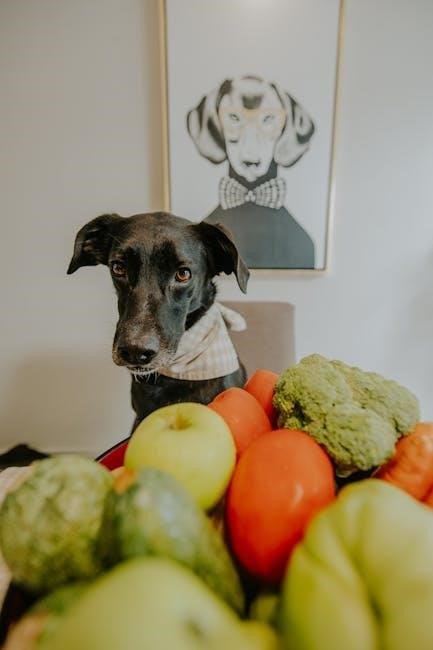
Symptoms of Food Toxicity in Dogs
Initial signs include vomiting, diarrhea, lethargy, and loss of appetite. Severe cases may lead to seizures, tremors, organ failure, and even life-threatening complications if untreated promptly.
Initial Signs of Poisoning
When a dog ingests toxic food, initial symptoms often appear within hours and may include vomiting, diarrhea, drooling, or a lack of appetite. Lethargy and abdominal pain are common, while some dogs might exhibit restlessness or panting. In cases involving chocolate or caffeine, increased heart rate and hyperactivity can occur. These early signs are critical indicators that your dog has consumed something harmful. It’s essential to monitor your pet closely and seek immediate veterinary advice if any unusual behavior is observed. Prompt action can prevent the progression of symptoms, which may escalate to more severe health complications if left untreated. Early recognition is key to ensuring your dog’s safety.
Severe Symptoms Requiring Immediate Attention
Severe symptoms of food toxicity in dogs demand urgent veterinary care. These include seizures, tremors, difficulty breathing, or collapse, which indicate a medical emergency. If your dog experiences rapid heart rate, pale gums, or blue-tinged lips, it signals poor oxygen flow and organ distress. In cases of extreme vomiting or diarrhea, dehydration can develop quickly, worsening the condition. If your dog loses consciousness or shows signs of organ failure, such as jaundice or bloody urine, immediate intervention is critical. Delaying treatment can lead to irreversible damage or even death. Always contact a vet or pet poison hotline immediately if these severe symptoms arise.

Prevention and Safety Measures
Secure food and toxic substances, use dog-safe treats, and dispose of waste properly. Educate yourself on harmful foods and consult your vet for personalized dietary advice.
Safe Human Foods for Dogs
While many human foods are toxic to dogs, some are safe in moderation. Carrots, green beans, and apples are nutrient-rich and digestible. Plain, cooked pumpkin can aid digestion, while sweet potatoes provide healthy fiber. Small amounts of plain, unflavored yogurt support gut health. Blueberries and strawberries offer antioxidants but should be given sparingly due to sugar content. Hard-boiled eggs and plain, cooked chicken are excellent protein sources. Always serve these foods plain, without added sugars, spices, or fats. Remember, treats should not replace a balanced canine diet. Always consult your veterinarian before introducing new foods to ensure they meet your dog’s nutritional needs.
Proper Food Storage and Disposal
Securely storing food and safely disposing of waste are critical to preventing accidental ingestion of toxic substances by dogs. Keep all potentially toxic foods, such as chocolate, grapes, and onions, in sealed containers or high cabinets. Dispose of food scraps in trash cans with tight-fitting lids to prevent curious dogs from accessing harmful items. Regularly clean up crumbs and spills to avoid temptation. Store medications and supplements securely, as they often contain substances toxic to dogs. Always double-check that garbage bins are out of reach, especially during meals or gatherings. Proper food storage and disposal can significantly reduce the risk of accidental poisoning.
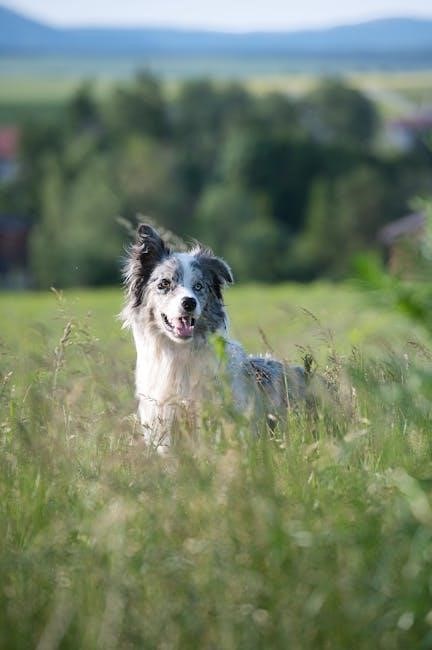
Long-Term Health Effects of Toxic Foods
Ingesting toxic foods can cause lasting harm to dogs, leading to organ damage, chronic illnesses, and compromised immune systems. Preventing exposure is vital for long-term health.
Organ Damage and Chronic Conditions
Ingesting toxic foods can lead to severe organ damage in dogs, particularly affecting the liver, kidneys, and heart. Substances like theobromine in chocolate and toxins in grapes can cause irreversible kidney failure. Prolonged exposure to harmful compounds, such as those in onions and garlic, may result in anemia and liver dysfunction. Xylitol, found in sugar-free products, can trigger acute liver failure, while repeated ingestion of toxic substances may lead to chronic conditions like pancreatitis or digestive disorders. These long-term health issues underscore the importance of a balanced diet and vigilant prevention to safeguard your dog’s well-being. Early recognition and veterinary intervention are critical to mitigating lasting harm.
The Importance of a Balanced Canine Diet
A balanced canine diet is essential for maintaining your dog’s overall health and preventing long-term complications. High-quality dog food provides the necessary nutrients, vitamins, and minerals tailored to their specific needs. Feeding a well-formulated diet reduces the risk of nutritional deficiencies and supports immune function, digestion, and skin health. It also minimizes the temptation to feed harmful human foods, which can lead to toxicity. A balanced diet ensures your dog thrives and reduces the likelihood of chronic health issues. Always consult your veterinarian to choose the best diet for your dog’s age, breed, and health conditions to promote long-term well-being and avoid potential risks associated with toxic substances.

The Role of Pet Owners in Preventing Toxicity
Pet owners play a vital role in preventing toxicity by educating themselves on toxic foods, ensuring safe food storage, and being vigilant during gatherings where harmful items may be accessible.

Education and Awareness
Education is key to protecting dogs from toxic foods. Pet owners must stay informed about hazardous items through reliable sources like the ASPCA or veterinary guidelines. Social media platforms, such as TikTok, feature veterinarians like Amir Anwary and pet care experts like Jade, who share critical warnings about toxic foods. Understanding which foods are dangerous, such as chocolate, grapes, onions, and Xylitol, empowers owners to make safer choices. Awareness campaigns highlight the risks of seemingly harmless items, encouraging owners to verify food safety before sharing. By prioritizing education, pet owners can prevent accidental poisoning and ensure their dogs lead healthier lives. Vigilance is essential, especially during gatherings or meals where toxic foods may be present.
Consulting Veterinarians for Dietary Advice
Consulting veterinarians is essential for ensuring your dog’s diet is safe and balanced. Veterinarians provide personalized advice based on your dog’s breed, age, and health conditions, helping you avoid toxic foods. They can guide you through complex dietary needs and identify potential risks in human foods. Relying on credible sources like the ASPCA or veterinary guidelines ensures accuracy. Veterinarians can also offer tailored solutions for dogs with specific allergies or sensitivities. By seeking professional advice, you can create a diet that maximizes your dog’s health while minimizing the risk of toxicity from harmful substances like chocolate or onions.
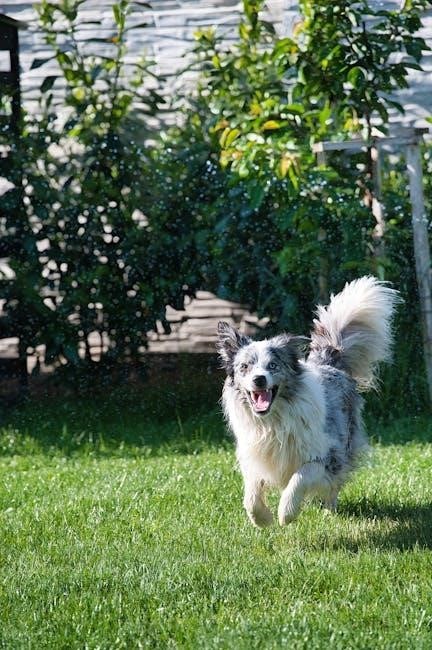
Emergency Response to Food Poisoning
If your dog ingests toxic food, act quickly. Contact your veterinarian or the ASPCA hotline immediately. Provide detailed information about the ingested substance for guidance.
What to Do If Your Dog Ingests Toxic Food
If your dog ingests toxic food, remain calm but act quickly. Immediately contact your veterinarian or a pet poison hotline, such as the ASPCA’s Animal Poison Control Center (APCC), for guidance. Provide details about the substance and amount consumed. Do not induce vomiting unless instructed by a professional. Keep emergency contact information readily available. Time is critical, as delays can worsen outcomes. Follow all advice provided by veterinary experts to ensure the best chance of recovery for your dog.
Important Contact Information for Emergencies
Knowing the right contacts can save your dog’s life in an emergency. Keep the ASPCA’s Animal Poison Control Center (APCC) hotline number handy: 1-888-426-4435. Another vital resource is the Pet Poison Helpline at 1-855-213-6680. These services are available 24/7 and can provide immediate advice if your dog ingests toxic food. Additionally, always have your veterinarian’s contact information easily accessible. Acting quickly and seeking professional guidance is crucial to ensuring your dog’s safety and recovery. Remember, delays can worsen outcomes, so staying prepared with these emergency contacts is essential for all dog owners.
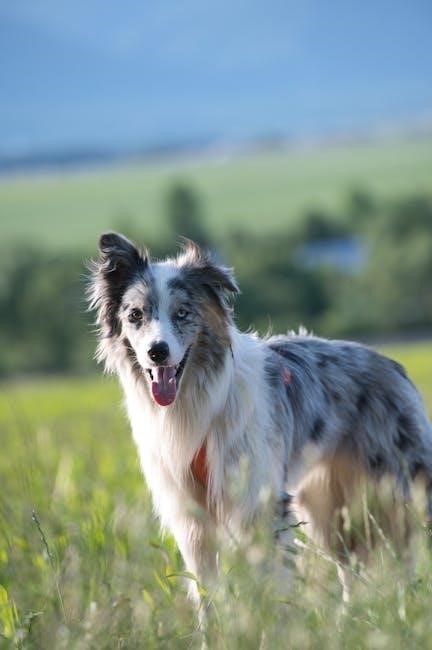
Safe Alternatives to Toxic Human Foods
Offer safe, healthy alternatives to toxic human foods, such as carrots, green beans, and apples. Consider homemade dog food recipes for a nutritious, controlled diet.
Healthy Treats for Dogs
Providing healthy, non-toxic treats is essential for your dog’s well-being. Carrots, apples, and green beans are excellent choices, offering nutritional benefits without risks. Sweet potatoes and blueberries are also safe and nutritious options. Homemade treats, like peanut butter-filled Kongs or pumpkin biscuits, can be prepared safely. Always ensure ingredients are dog-friendly and avoid additives. Consulting with a veterinarian before introducing new foods is advisable to prevent allergic reactions or digestive issues. Healthy treats reward your dog positively while maintaining their safety and health. Choose wisely to keep your furry friend happy and thriving.
Homemade Dog Food Recipes
Preparing homemade dog food can be a healthy alternative to commercial options, ensuring safety and quality. Simple recipes include brown rice, lean ground turkey, and steamed carrots. Sweet potatoes, green beans, and apples are also great additions. For variety, try fish-based meals with cod or salmon, mixed with quinoa and pumpkin. Always avoid toxic ingredients like onions, garlic, and chocolate. Homemade diets allow customization to meet your dog’s specific needs and allergies. Consult a veterinarian to ensure nutritional balance and safety. These recipes promote health and satisfaction, giving you peace of mind about your dog’s diet.
Protecting your dog from toxic foods requires awareness and responsible feeding practices. Avoid harmful ingredients like chocolate, grapes, and onions, which can lead to severe health issues or fatalities. Always consult a veterinarian for dietary advice and opt for balanced, safe dog food options to ensure your pet’s well-being and longevity.
Final Thoughts on Keeping Your Dog Safe
Awareness and education are key to safeguarding your dog from toxic foods. Many common human foods, such as chocolate, grapes, and onions, pose serious risks. Always prioritize a balanced, nutrient-rich diet specifically formulated for dogs. Pet owners must remain vigilant, ensuring toxic substances are out of reach. Small mistakes can lead to severe health complications, emphasizing the importance of proactive care. By understanding potential dangers and taking preventive measures, you can significantly reduce risks and help your dog enjoy a long, healthy life.


